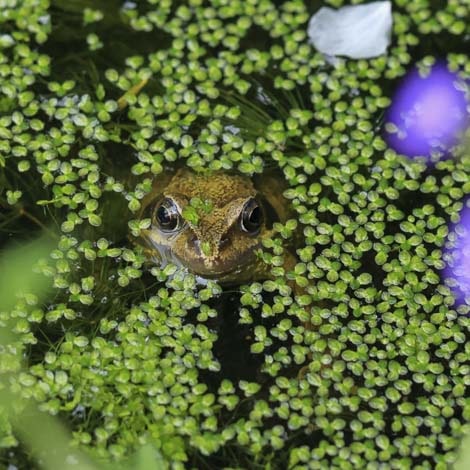Asked By: Rodney of Fort Smith, AR
A: Very fast. Duckweed grows more quickly than any other plant—under ideal conditions, it can double in mass overnight. With that in mind, it’s easy to see how duckweed in ponds can rapidly become a problem. As these tiny plants cover the water’s surface, they block out sunlight and reduce oxygen, making it difficult for other aquatic life to survive.
What is Duckweed?
Duckweed (Lemna minor) consists of light-green clover-shaped leaves that float on top of still water, primarily in lakes and ponds, but also sluggish streams and canals. Each leaf is approximately three-sixteenths to one-eighth of an inch in diameter and there is a small, thread-like root that dangles down into the water. Duckweed leaves tend to group together, forming dense colonies.
It is easy to confuse duckweed with watermeal, a similar nuisance plant. However, watermeal is a bit smaller, and the leaves are more rounded and seed-like. Watermeal also does not have a root attached.
How Does Duckweed Reproduce?
How does duckweed grow so fast? It comes down to this plant’s unique reproduction cycle. While duckweed can reproduce sexually by flowering and spreading seeds, this is quite rare. Instead, asexual reproduction drives the rapid growth rate of duckweed plants. The leaves produce small buds which break off from the parent plant and develop into new organisms which repeat this cycle.
How to Get Rid of Duckweed
When duckweed starts to take over your backyard lake or pond, you can tackle it mechanically or chemically.
One option is mechanical removal with a rake or skimmer. Simply skim over the surface of the water and remove any duckweed leaves along the way. The drawback to this method is that it is difficult to completely remove every leaf. Even a single leaf left behind will bud, causing duckweed to regrow.
Herbicide is the most effective way to combat a duckweed outbreak. Aquatic weed control products such as Ultra PondWeed Defense and KnockDown Defense can help kill off any weeds in your pond. KnockDown Defense will also take care of floating algae, which may be impacting water quality and contributing to the duckweed problem. Combine aquatic weed killers with Treatment Booster Plus to increase chemical effectiveness.
A long-term approach to duckweed management involves stronger herbicides like WipeOut or Sonar A. S. by SePRO. These products contain fluridone, which can control aquatic weed populations over the course of an entire season when applied in the spring. Because sunlight can reduce fluridone’s effectiveness, we recommend supplementing this treatment with Pond Dye to block excess UV rays.
Duckweed Prevention
Once you have eliminated your duckweed problem, the next step is prevention. Duckweed thrives in calm, stagnant water. Focus on improving water quality and adding aeration to keep future outbreaks at bay.
Use an all-in-one pond care solution like ClearPAC Plus to keep your water free from muck and debris all season long. Plus, install an Airmax Aeration system to create water movement that discourages duckweed growth.
Aquatic Weed Control Tips for Duckweed and More
If you are still struggling with how to get rid of duckweed in pond water, contact the experts at The Pond Guy for additional help at 866-766-3435.
Read more related articles about duckweed elimination below:
Duckweed in Ponds
Treat & Control Duckweed
How to Treat Pond Weeds
Last Updated: May 20, 2024

